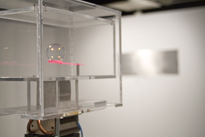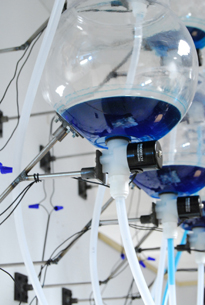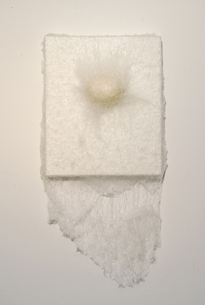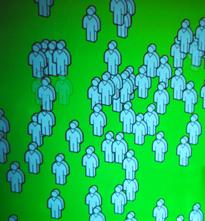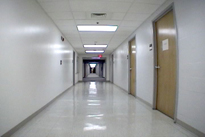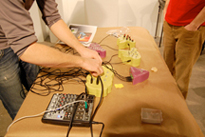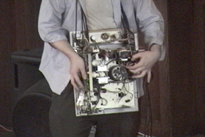LiveBox
| Home Mission Exhibitions Submissions Store News Contact |
|
|
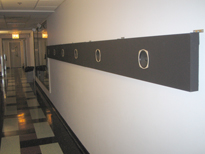 |
Canvas 219, Cassandra Jackson and Ben Carney collaborative, interactive sound installation; 18-ft panel, speakers, IR sensors, computer, custom hardware and software. Canvas 219 is a structure for framing sound work that is built entirely from hacked electronics, scrapped equipment and open source hardware and software. Sound becomes an assertive force, rather than a passive flow that is in our day-to-day lives. The viewer actualizes a direct relationship, with the content of the piece, as physical presence is critical for the emergence of sound. |
|
Wallpaper, Spencer Hutchinson, video projection The conceptual motivations behind Hutchinson’s work exist to emphasize the manner in which perceptual faculties and intellect mold interpretations of the human environment. The majority of Spencer’s work is non-visual, his artistic activities also encompass 3D animation and imagery, painting, print media, prose and poetry, drawings, sculpture, video and performance.
|
|
"Impossibility of Stillness", Brook Jonquil Brookhart Jonquil's work challenges the viewer to understand their relationship with the physical world. Of particular concern are aspects such as consciousness and observation. Jonquil conflates mind and consciousness with the body, and positions the individual as a dynamic organ of the environment. By taking a systemic view of our relationship with reality, his work seeks to transform our fundamental assumptions about objectivity and subjectivity. |
|
The Assumption of Critical Mass, Mik Kastner In this series, Mik Kastner created an elaborate device to slowly dissolve various materials such as sugar and salt. The apparatus and resulting phenomena are viewed as a contemplative metaphor of natural processes pushed to eventual destruction by mechanical means. The consistent thump of the valves opening and closing acts as a type of timer, reminding us of the inevitable outcome of this endeavor.
Preservation Reservation, Mik Kastner Kastner deploys a method utilized in the special effects industry for creating realistic looking cobwebs. His interest in the material began as an exploration of the way we attempt to recreate and control natural processes and phenomena that normally are unwanted or destroyed. The approach reference the act of preservation and cocooning of food that is intrinsic to a spider’s survival. However here, this method is twisted into the very humanistic quality of mass production and wastefulness. |
|
|
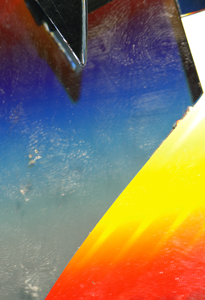 |
Broken Mirrors, Alex M Lee, inkjet prints Alex Lee's work is an attempt to reconcile and reflect the manner in which our era of technologies effects our reaction and understanding of pictures. In the Broken Mirrors series, various broken mirrors were arbitrarily arranged and scanned on a flatbed scanner. The images are self-referential to the manner in which they were made. Dirt, grime, and fingerprints that were on the mirrors were included adding to the surface quality of the images. |
|
Icons, Micah Schippa, single channel video Technology is shifting our traditional perceptual modes. The ideas of touch, presence, place and time are slowly becoming unrecognizable, if not forever altered. My work attempts to engage the space between biological and technological systems, the machine and the body, physics and metaphysics. My working method attempts a synthesis of the hyperbolized to the minimal and the minimized to the hyperbole through a constantly shifting subject/medium relationship.
|
 |
on The Ball, Shane Mecklenburger, single channel video on_The Ball uses a pool table as a metaphor for agency and the unspoken boundaries we agree upon from moment to moment. The cue ball has been fixed to the center of the video image through motion tracking, and the result is a table bouncing around a ball. The inversion calls attention to the limits of the playing field. Who has more agency, the player or the rules of the game? |
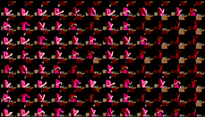 |
PEEl, Surabhi Saraf, single channel video Peel presents a visual and sonic echo of the present instance: it takes an unexamined moment and gives it life. The transitional motion of going to the fridge to get an ingredient is stretched into the echo of an unforgettable instant, and what emerges is an examination of the subtlety and hidden beauty of that moment. |
|
Vanderbilt Medical Research Center, Sandra Rosas Ridolfi, single channel video The Vanderbilt Medical Research Center video was shot during Ridolfi's stay at the Center as a subject of study. The video was developed to convey the space and the passing of time while trapped in the same four walls for a month. Ridolfi explores the notion of time and duration – specifically the differences there are between the social construct of time and the "body time" (circadian rhythms, chronobiology, psychological time, etcetera).The endeavor is personal, Ridolfi suffers from orthostatic intolerance combined with postural tachycardia syndrome, which directly affects heart rate and circadian rhythms. |
|
Urban Artificial Species, Wonbin Yang, kinetic sculpture. The Spherical Luminary Robot Species is one of the Urban Artificial Species series. Yang is intrigued with artificial life forms and man’s relationship with machines. He creates robotic creatures from his fantasies. The robot is programmed to operate autonomously living off its relationship to the environment. The robot’s movement toward the sun is a strategy to survive. In addition, the robot senses natural phenomena, and expresses that experience by illuminating light patterns. Light patterns are expressed by the robot, as a visual language, to communicate. |
|
Performance by Mark Franz and Max Alexander and Ryan Dunn Mark Franz, animator, writer, and circuit bender, performs with Max Alexander, musician and composer; pieces are formed and framed by Franz?s handmade sequencers, filtered through both performers, mediated by software built by Alexander. The work acknowledges the approaches of both artists - literary/design, transcendental/formal. Performances can walk the line between narrative and static, performance and installation. Ultimately the coming together of two disparate yet connected artists in an exciting and fruitful atmosphere – playful and approachable. There projects are malleable enough to be placed in any number of situations: installation or performative are both equally appealing possibilities. Ryan Dunn performs solo as Instinct Control. He finds and play a musical instrument in a reel-to-reel tape recorder by touching the circuitry. Dunn’s dialogue with the obsolete re-envisions the experience of a preexisting system through direct intervention. sounds range from extreme and aggressive, to soft and deliberate, a meditation on the aging device and its relationship to the runaway pace of our society's technological development. |
|
Justin Block, performance, wearable art. Justin Block has worked in a wide variety of mediums from printmaking to electronics. He recently graduated from the School of the Art Institute of Chicago with a masters in fine art focusing in technological studies and sees art as a futile attempt to relate himself to the material world and to other people.
|
|
|

